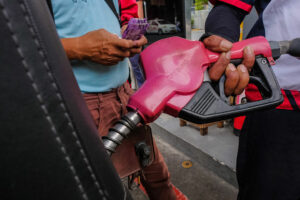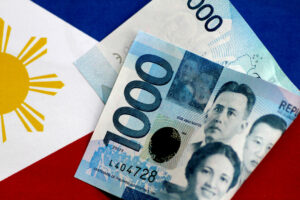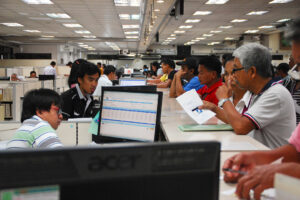By Sheldeen Joy Talavera and Chloe Mari A. Hufana, Reporters
OIL FIRMS have agreed to implement the pump price hike in two tranches this week to lessen the burden on consumers, the Department of Energy (DoE) said on Monday.
Seaoil Philippines, Shell Pilipinas Corp., Petron Corp., Caltex Philippines, PetroGazz Ventures Philippines Corp., Unioil Petroleum Phils., Inc., Jetti Petroleum Inc., and Cleanfuel said they will increase gasoline prices by P1.75 per liter, diesel by P2.60 per liter, and kerosene by P2.40 per liter, effective June 24.
A second round of price hikes will be implemented either on June 26 or June 27.
Seaoil, Shell, Caltex and Petron said they will raise gasoline prices by P1.75 per liter, diesel by P2.60 per liter, and kerosene by P2.40 per liter on June 26. Jetti and PetroGazz will hike pump prices by the same amount on June 27.
The DoE on Monday said it met with representatives of the downstream oil industry who agreed to a staggered implementation of the big-time price hike this week.
“Our dialogue with industry players today reflects our shared commitment to balance economic realities with the need to shield our people from sudden price shocks, and we are pleased to report that they have responded positively to our request,” DoE Officer-in-Charge Sharon S. Garin said in a statement.
Present during the DoE meeting were representatives from Petron, Shell Pilipinas, Caltex, Jetti Petroleum, PetroGazz, Phoenix Petroleum, PTT Philippines, Seaoil, Total, Unioil Petroleum Philippines, Filpride, and Cleanfuel.
The DoE earlier estimated that diesel prices to go up by P4.30-P4.80 per liter; and gasoline by P2.50-P3 per liter this week.
Global crude oil prices surged amid the escalating conflict in the Middle East. After the US struck several nuclear sites in Iran, the latter’s parliament is now considering the closure of the Strait of Hormuz, a waterway between Iran and Oman which around 20% of the world’s oil passes through, Reuters reported.
Energy Undersecretary Alessandro O. Sales said the recent volatility in oil prices is mainly due to speculative trading amid geopolitical uncertainty and not actual supply disruptions.
“We are closely monitoring global oil price benchmarks and foreign exchange trends, but we also urge them to exercise prudence in passing on cost changes to consumers,” he said.
“Much of the recent price volatility is being driven not by actual supply disruptions, but by speculative trading due to geopolitical uncertainties,” he added.
The DoE said that it is implementing measures “to ensure adequate domestic fuel supply, including compliance with mandatory inventory requirements for oil companies.”
Under existing regulations, oil companies are required to keep a 30-day inventory of fuel.
At the same time, Ms. Garin also urged oil companies to expand the number of their retail stations offering fuel discounts to the transport sector.
ECONOMIC TEAM MEETINGMeanwhile, President Ferdinand R. Marcos, Jr. called for a meeting with his economic team to discuss contingency plans amid fears that the potential closure of the Strait of Hormuz will disrupt global supply, Malacañang said.
Palace Press Officer Clarissa A. Castro declined to give further details about the meeting, but said the government is preparing to roll out a fuel subsidy for public utility vehicle drivers. The government has allotted P2.5 billion for this initiative.
Should global crude prices breach the $80-per-barrel threshold, fuel subsidies for public transport drivers and fisherfolk will be automatically triggered.
“It will cause a domino effect because even if we say that our drivers will have a fuel subsidy, it is inevitable that it will also be spread to logistics [and] to trading,” Ms. Castro said in Filipino.
At the same time, Ms. Garin is scheduled to meet with officials from the Transportation and Agriculture departments on Tuesday to discuss the timely rollout of targeted subsidies for public transport drivers and farmers.
As of June 23, the average price of Dubai crude oil stands at $75.16 per barrel.
According to Ms. Castro, Mr. Marcos assured Filipinos the government is doing everything to cushion the impact of the impending oil crisis.
“We are ready for anything that may happen, and the government will meet all the needs of the people, and they should not worry because the government is now working for all of us,” she said in Filipino.
OVERDEPENDENCE ON IMPORTSAmid the escalating conflict in the Middle East, the government should focus on how to reduce dependence on imported oil by boosting local upstream exploration, according to Edgar Benedict C. Cutiongco, president of the Philippine Petroleum Association.
Mr. Cutiongco told BusinessWorld that there is a need to enhance incentives and support the DoE’s efforts to attract investment in oil and gas exploration and production, including “attractive fiscal terms and a stable regulatory environment.”
“To improve the overall landscape, incentives are being re-evaluated beyond their current upstream oil industry focus,” he said. “While the downstream sector inherently gains from a stable supply of indigenous fuel, further improvements include enhancing the one-stop shop for permitting and transitioning from net oil sharing to gross production sharing incentives.”
He added that the government should “prioritize and expedite exploration within clear Philippine jurisdiction while closely monitoring developments in the West Philippine Sea.”
The upstream sector of the oil and gas industry focuses on the exploration, drilling, and production of crude oil and natural gas.
The Philippines imported 3,476 million liters of crude oil during the first half of 2023, higher by 23.7% in 2022, according to the DoE.
At the same time, IBON Foundation Executive Director Jose Enrique “Sonny” A. Africa said the Philippines has limited room to maneuver as it is dependent on imported fuel.
“These make us very economically vulnerable from any escalation in the Israel-Iran conflict,” he said in a Viber chat.
Any increase in oil prices will stoke inflation and deepen inequality, according to Mr. Africa.
“Rice prices, for instance, are vulnerable to the effect of oil prices on diesel fuel, transportation, fertilizers and other production costs,” he added. “The government should realize that it’s long overdue to reduce dependence on volatile global markets and build a more resilient domestic economy with greater food and energy self-sufficiency.”





